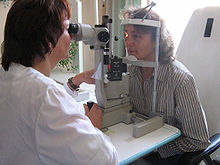Watzke–Allen test
| Watzke-Allen test | |
|---|---|
 A macular hole | |
| Purpose | diagnosis of full thickness macular hole |
Watzke-Allen test (WAT) also known as Watzke-Allen slit beam test (WASBT) is a test used in the diagnosis of a macular hole, a condition affecting the macular region in the retina of the eye. The test is done by projecting a thin line of light over the macula with a slit lamp.
Theory
[edit]Watzke-Allen test is a test used in the diagnosis of a macular hole. It is a subjective test based on photoreceptor (cone cell) displacement.[1]
Test can be used to differentiate full thickness macular hole from other similar conditions and also to assess retinal function after surgical closure of the hole.[2][3]
Procedure
[edit]
Watzke-Allen test is done by projecting a thin line of light over the macula with a slit lamp.[4] A fundus lens or macular lens is used to aim beam of light on the macula.[5] It is best performed in a dilated eye, projecting a slit beam of approximately 100 μm. The slit is projected in both vertical and horizontal orientations.[6] The patient is asked to describe whether the light line is straight or narrow or has a gap (break). A straight line indicates an intact fovea where as narrow or gapped line indicate macular holes.[7] A narrowing indicates isolated, damaged but functional foveal receptors.[7] Patient may be asked to draw what he sees.[6]
Advantages and disadvantages
[edit]The advantages of WAT are its availability, affordability, easy to perform and ability to be used through relatively opaque media, which can help overcome the limitations of spectral-domain OCT, however, it is not known whether the measurements recorded by WAT reflect the true extent of photoreceptor displacement.[6][1]
References
[edit]- ^ a b Mizuguchi, Tadashi; Horiguchi, Masayuki; Tanikawa, Atsuhiro; Sakurai, Ryouta (2021-09-01). "Asymmetric extent of distortion measured using the Watzke-Allen Test in patients with macular hole". Heliyon. 7 (9): e08059. doi:10.1016/j.heliyon.2021.e08059. ISSN 2405-8440. PMC 8488488. PMID 34632139.
- ^ "MORE SENSITIVE LINE TEST AS ALTERNATIVE TO WATZKE–ALLEN SLIT– BEAM IN PATIENTS AFTER ANATOMICALLY SUCCESSFUL CLOSURE OF IDIOPATHIC MACULAR HOLE". Investigative Ophthalmology & Visual Science. 45. May 2004. Archived from the original on 2023-02-19. Retrieved 2023-02-19.
- ^ Veiga-Reis, Francyne; Dias, Renato Braz; Nehemy, Márcio B. (December 1997). "Differential diagnosis of macular hole: Watzke-Allen test and laser aiming beam test". Arquivos Brasileiros de Oftalmologia. 60 (6): 631–634. doi:10.5935/0004-2749.19970012. ISSN 0004-2749.
- ^ "Watzke-Allen sign". Oxford Reference. Archived from the original on 2023-02-22. Retrieved 2023-02-19.
- ^ Maharana, Prafulla Kumar; Sharma, Namrata; Kumar, Atul (2017-09-30). Ophthalmology Clinics for Postgraduates. JP Medical Ltd. ISBN 978-93-86322-89-0. Archived from the original on 2023-11-07. Retrieved 2023-02-22.
- ^ a b c MPH, By Juan Canizales, OD, and Christopher Suhr, OD. "Macula Exam Tips and Tricks". www.reviewofoptometry.com. Archived from the original on 2023-02-19. Retrieved 2023-02-19.
{{cite web}}: CS1 maint: multiple names: authors list (link) - ^ a b Themes, U. F. O. (2016-11-05). "Macular Hole". Ento Key. Archived from the original on 2023-02-19. Retrieved 2023-02-19.
